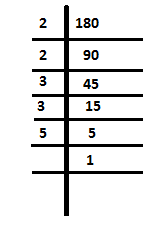
Express the number 180 as a product of its prime factors.
Answer
590.7k+ views
Hint:
Here the given number is a composite number but we have to express it as a product of prime factors.So we will divide the number with prime numbers only and then their product will be our answer.
Complete step by step solution:
The given number is 180.
Let’s use the prime factorization method.

Thus 180 \[ = 2 \times 2 \times 3 \times 3 \times 5\]
Additional information:
1) Prime factorization is the method used to find the H.C.F. of numbers.
2) In this method, the number is broken down or is expressed in the form of the product of prime numbers only.
3) The prime numbers can be repeated if required.
4) Factors can be defined as the numbers which when divided the respective number leaves zero remainders.
5) Factors are not necessarily prime numbers but prime factors are only prime numbers.
6) Prime numbers are the numbers that are divisible by one and the number itself.
7) There are two methods involved in the prime factorization
7.1) Division method
7.2) Factor tree method.
8) All even numbers have 2 as one of their factors compulsorily.
9) If a number is having either 0 or 5 in its units place then 5 is one of its fixed factors
10) Numbers ending with 0 have 2,5,10 as their factor.
11) Factors are never decimals or fractions.
12) The smallest factor of every number is 1.
Note:
The prime numbers can be repeated if required. Factors can be defined as the numbers which when divided the respective number leaves zero remainder. Factors are not necessarily prime numbers but prime factors are only prime numbers.
Here the given number is a composite number but we have to express it as a product of prime factors.So we will divide the number with prime numbers only and then their product will be our answer.
Complete step by step solution:
The given number is 180.
Let’s use the prime factorization method.

Thus 180 \[ = 2 \times 2 \times 3 \times 3 \times 5\]
Additional information:
1) Prime factorization is the method used to find the H.C.F. of numbers.
2) In this method, the number is broken down or is expressed in the form of the product of prime numbers only.
3) The prime numbers can be repeated if required.
4) Factors can be defined as the numbers which when divided the respective number leaves zero remainders.
5) Factors are not necessarily prime numbers but prime factors are only prime numbers.
6) Prime numbers are the numbers that are divisible by one and the number itself.
7) There are two methods involved in the prime factorization
7.1) Division method
7.2) Factor tree method.
8) All even numbers have 2 as one of their factors compulsorily.
9) If a number is having either 0 or 5 in its units place then 5 is one of its fixed factors
10) Numbers ending with 0 have 2,5,10 as their factor.
11) Factors are never decimals or fractions.
12) The smallest factor of every number is 1.
Note:
The prime numbers can be repeated if required. Factors can be defined as the numbers which when divided the respective number leaves zero remainder. Factors are not necessarily prime numbers but prime factors are only prime numbers.
Recently Updated Pages
Basicity of sulphurous acid and sulphuric acid are

Master Class 11 Business Studies: Engaging Questions & Answers for Success

Master Class 11 Computer Science: Engaging Questions & Answers for Success

Master Class 11 Economics: Engaging Questions & Answers for Success

Master Class 12 English: Engaging Questions & Answers for Success

Master Class 12 Social Science: Engaging Questions & Answers for Success

Trending doubts
What is the capital city of Australia? A) Sydney B) Melbourne C) Brisbane D) Canberra

Give 10 examples for herbs , shrubs , climbers , creepers

Draw a diagram of nephron and explain its structur class 11 biology CBSE

Explain zero factorial class 11 maths CBSE

Draw a labelled sketch of the human eye class 12 physics CBSE

Chemical formula of Bleaching powder is A Ca2OCl2 B class 11 chemistry CBSE





